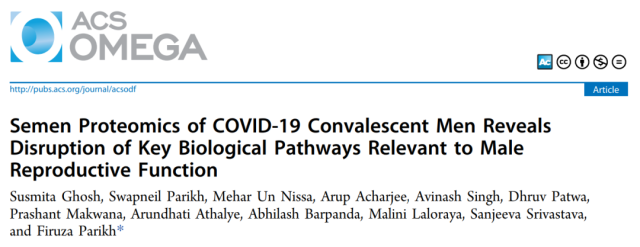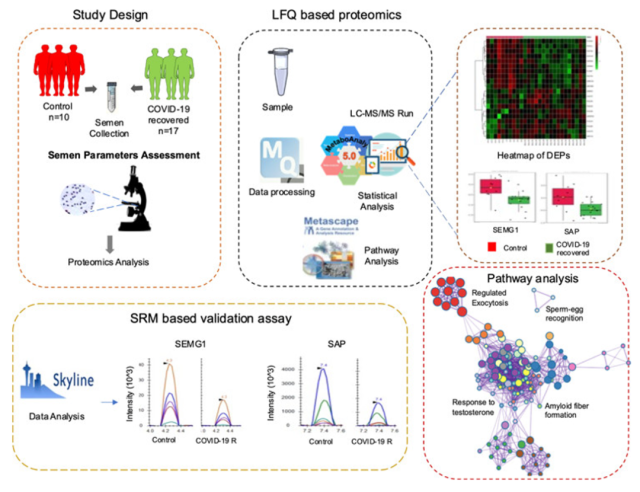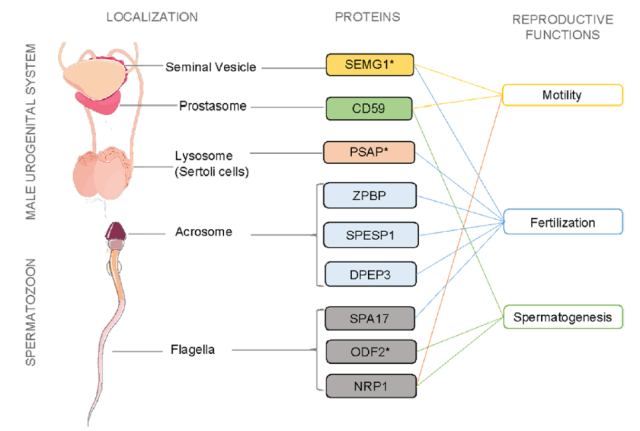The new coronavirus changes the levels of male fertility-related proteins
- A Single US$2.15-Million Injection to Block 90% of Cancer Cell Formation
- WIV: Prevention of New Disease X and Investigation of the Origin of COVID-19
- Why Botulinum Toxin Reigns as One of the Deadliest Poisons?
- FDA Approves Pfizer’s One-Time Gene Therapy for Hemophilia B: $3.5 Million per Dose
- Aspirin: Study Finds Greater Benefits for These Colorectal Cancer Patients
- Cancer Can Occur Without Genetic Mutations?
The new coronavirus changes the levels of male fertility-related proteins
- Red Yeast Rice Scare Grips Japan: Over 114 Hospitalized and 5 Deaths
- Long COVID Brain Fog: Blood-Brain Barrier Damage and Persistent Inflammation
- FDA has mandated a top-level black box warning for all marketed CAR-T therapies
- Can people with high blood pressure eat peanuts?
- What is the difference between dopamine and dobutamine?
- How long can the patient live after heart stent surgery?
The new coronavirus changes the levels of male fertility-related proteins and the changes persist after recovery.
The new coronavirus (SARS-CoV-2) usually infects humans through the respiratory tract and causes respiratory damage, but later studies have found that the heart, esophagus, kidneys, liver, eyes, bladder, digestive system, testes, and even the brain can all Being infected by the new coronavirus can be said to be able to fully attack all organs and tissues of the human body.
Many studies have pointed out that the new coronavirus infection will not only bring disease and death, but also cause other complications, and cause sequelae of varying degrees and symptoms after the patient recovers. Common sequelae are: loss of smell and taste , fatigue , dyspnea , joint pain , chest pain , depression and so on.
More and more studies have proved that in addition to the above-mentioned sequelae after COVID-19 infection, it will also damage fertility .
As early as February 2020, Fan Caibin and others from the Department of Urology, Suzhou Hospital Affiliated to Nanjing Medical University published a paper on the preprint medRxiv, pointing out that the testis may be a potential target of the new coronavirus [1] .
Afterwards, researchers from the Center for Reproductive Medicine, Zhongnan Hospital of Wuhan University, published a paper in the preprint medRxiv, and clinically observed hypogonadism in male patients with COVID-19 [2] .
In February 2021, researchers from the University of Florence in Italy published a paper in the journal Human Reproduction [3] . It was found that 25% of men who recovered from the COVID-19 infection developed azoospermia or oligospermia .
In February 2022, the team of Yuan Guoyong of the University of Hong Kong published a paper in the journal Clinical Infectious Diseases [4] .
The study confirmed that SARS-CoV-2 can cause acute testicular damage, chronic asymmetric testicular atrophy, and hormonal changes in hamsters, even though SARS-CoV-2 caused them only mild pneumonia.
Professor Yuan Guoyong said that for those who have recovered from the COVID-19 infection, it is necessary to pay attention to the possible hypogonadism (low libido) and reduced fertility , and the COVID-19 vaccination can prevent the emergence of such complications.
In March 2022, the ACS Omega journal published a research paper titled: Semen Proteomics of COVID-19 Convalescent Men Reveals Disruption of Key Biological Pathways Relevant to Male Reproductive Function [5] .
The study analyzed protein levels in the semen of men who recovered from Covid-19 and found that even those with mild or moderate symptoms had significantly lower sperm counts and motility after recovery, fewer normal-shaped sperm, and less Functionally relevant protein levels were also substantially altered.

Although the new coronavirus mainly affects the respiratory system, the new coronavirus can also invade and affect other tissues, and some recent studies have shown that the new coronavirus infection can reduce male fertility, and the presence of the new coronavirus has been detected in the male reproductive system.
Therefore, the research team wanted to find out whether the COVID-19 infection will have long-term effects on the male reproductive system.
To find the answer to this question, the research team used proteomic analysis to compare the protein levels in the semen of healthy men and men recovered after mild or moderate Covid-19 infection.
The research team analyzed semen samples from 10 healthy men and 17 men who had recently recovered from Covid-19 infection, ranging in age from 20 to 45, and all had no history of infertility. The research team found that men who recovered from COVID-19 had significantly lower sperm counts and motility, and fewer normal-shaped sperm, compared to healthy men who were not infected with COVID-19 .
When the researchers analyzed semen proteins using liquid chromatography-tandem mass spectrometry, they found that men who recovered from COVID-19 had increased levels of 27 proteins and decreased levels of 21 proteins compared to controls. Many of these proteins are involved in reproductive function.

Among them, the levels of two fertility-related proteins SEMG 1 and PSAP in the semen of the COVID-19 survivors were lower than half of the semen of the control group.
 Important proteins related to male fertility, proteins affected by the COVID-19 are marked with an asterisk
Important proteins related to male fertility, proteins affected by the COVID-19 are marked with an asterisk
These findings suggest that SARS-CoV-2 has direct or indirect long-term effects on male reproductive health that persist in patients with mild to moderate symptoms and after recovery . Therefore, long-term evaluation of male recovered patients is warranted.
Professor Yuan Guoyong of the University of Hong Kong said in a previous research paper that for those who have recovered from the COVID-19 infection, it is necessary to pay attention to the possible hypogonadism (low libido) and reduced fertility , and the COVID-19 vaccination can prevent the occurrence of such complications.
Reference :
https://doi.org/10.1101/2020.02.12.20022418
https://doi.org/10.1101/2020.03.21.20037267
https://doi.org/10.1093/humrep/deab026
https: //doi.org/10.1093/cid/ciac142
https://pubs.acs.org/doi/10.1021/acsomega.1c06551
The new coronavirus changes the levels of male fertility-related proteins and the changes persist after recovery.
(source:internet, reference only)
Disclaimer of medicaltrend.org
Important Note: The information provided is for informational purposes only and should not be considered as medical advice.



